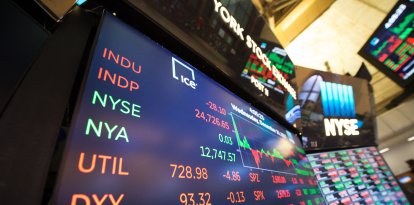Dollar closes 2024 as the world's strongest currency
The currency has gained 6.5% against major international currencies, partly fueled by the optimism surrounding Donald Trump's return to the presidency.

Dollar bills
The dollar finishes 2024 with a 6.5% gain against major international currencies, driven by strong performance in the country's equity markets and bolstered by optimism following Donald Trump's return to the presidency.
The domestic currency reached levels that outperformed the British pound, the euro, and G10 currencies such as the Japanese yen, Norwegian krone, and New Zealand dollar, all of which retreated against the U.S. dollar.
"The optimism generated by Trump boosted the currency to record highs"
Jordan Rochester, strategist at Mizuho Bank, said that the dollar's recovery was supported by stronger economic data in the final quarter of the year. "Since September, U.S. indicators showed a clear improvement, which along with the optimism generated by Trump boosted the currency to record highs."
Yields on the 10-year Treasury bond reached highs of 4.64% last week. Elsewhere, major U.S. stock indexes closed with losses, dragged down by year-end adjustments.
Asia
In Asia, markets offered a contrast. December data in China showed that the manufacturing sector grew very little. However, the services and construction sectors showed signs of recovery.
The CSI 300 index of mainland Chinese stocks rose 14% in 2024, marking its first annual gain after three years of declines. Hong Kong's Hang Seng Index also ended the year up 18%. In contrast, South Korea's KOSPI fell 10%, impacted by political instability.
In monetary policy, movements were also notable. While the Chinese yuan struggled with challenges related to trade and economic growth, other regional currencies faced pressure as well, weakened by the strength of the dollar.
Europe
In Europe, results were mixed. While the French CAC 40 index fell 2.8% due to political and budgetary uncertainties, the German DAX gained 18%, buoyed by strong performances from companies like SAP.
As the dollar strengthened, the British pound lost 1.4% in 2024, closing at $1.26. The euro fell 5.5% to end at $1.04.
Looser monetary policy in Europe contributed to the weakening of these currencies. The European Central Bank lowered its deposit rate from 4% to 3%, with further cuts anticipated in 2025.
Commodities and outlook
In the commodities market, oil ended the year with modest losses compared to the previous year, driven by concerns over global demand. In contrast, gold surged 26%, benefiting from its safe-haven appeal amid a year dominated by geopolitical tensions and monetary easing.

























